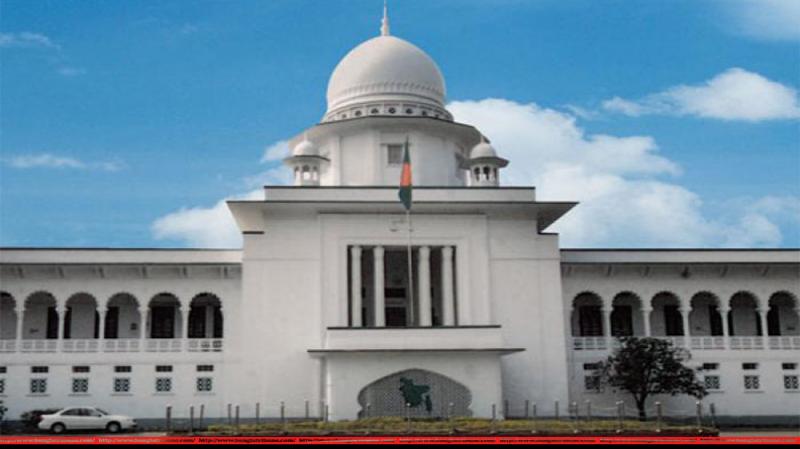 The High Court has issued a set of guidelines for lower court judges over conducting judicial enquiries into cases and dealing with them.
The High Court has issued a set of guidelines for lower court judges over conducting judicial enquiries into cases and dealing with them.
The 15-point guideline has been featured in the full version of a previous verdict by the bench of Justice Md Rezaul Haque and Justice Muhammad Khurshid Alam Sarkar.
On Feb 15, the court disposed of a petition challenging a 2012 verdict by a sessions judge in Gaibandha.
The High Court recently published the full verdict after the judges signed it on May 27, according to officials.
The court instructed district sessions judges to hold a judicial conference within 15 days to brief the lower court judges on the new guidelines.
The court said in its verdict that sessions judges while exercising criminal revisional power, should not shrug off their duties and responsibilities of revising impugned judgement or order by only agreeing or disagreeing,
“They (sessions judges) are statutorily obliged to delve deep into the question of law in the context of the given facts of the concerned case and, then, record their own views/reflecting their independent performance and competence,” it reads.
The court ordered sessions judges to be judicious and prompt in disposing of revisional matters. “... so, that the general people cannot blame the judiciary that the enquiry or trial of a case is delayed due to the poor and show performance of the courts.”
Highlighting aloofness of judicial officers as retirement nears, the High Court said district and sessions judges must shun it to uphold the judiciary’s image.
“They should put in their best efforts to earn recognition from the citizenry that the judiciary is the most dynamic and patriotic organ of the State, being maned and run by honest, brilliant, vigilant and skilled officers,” the verdict reads.
It also instructed district judges to hold a judicial conference at least once every month with all lower judges including, magistrates.
Judicial enquiry
The sessions judges have to hear testimonies of those witnesses named in Naraji (objection) petitions if needed, though it’s the primary responsibility of the magistrate, who conducted the probe.
In case of pleas objecting to a judicial enquiry’s findings, the magistrate will have to inspect the scene if deemed necessary. If needed, a magistrate can include his own observation as well as the mental state and behaviour of the witnesses in the investigation report.
The guidelines say a judicial magistrate has to finish the investigation as quickly as possible.
Cognizance
Magistrates have to go through the prosecution materials, like first information reports (FIRs), sketch maps, index, seizure list, medical and autopsy reports, witness statements recorded under Sections 161 and 164, case diary before taking a case into the court’s cognizance.
If a judicial enquiry has been conducted, then its findings will have to be taken into consideration.
In case of complaint cases (CRs), witness’ testimony under Section 200 of Code of Criminal Procedure has to be recorded in a concise manner, so the nature of charges can be easily identified.
The magistrate has to be convinced of prima facie before taking cognizance of any offence.
Magistrates have been instructed follow the precedence of the Aleya vs State litigation for cases filed under the Negotiable Instruments Act’s Section 138.
Before taking cognizance of criminal charges against an individual, the judge has to consider all the facts. The decision can’t be solely based on recommendations by the investigation officer (IO) or the magistrate who led the judicial probe.
If necessary and there are sufficient grounds, the judge can include an individual when taking cognizance of criminal charges, even if it was not recommended by the IO or the magistrate-led probe.
However, judges will not have the power to exclude an individual if a charge sheet is filed against him or her or if the judicial probe recommends pressing charges.
 Others
Others
41050 hour(s) 27 minute(s) ago ;
Morning 05:21 ; Monday ; Jun 23, 2025
HC rolls out guideline for lower court judges
Send
Bangla Tribune Report
Published : 22:56, Jun 04, 2018 | Updated : 23:01, Jun 04, 2018
Published : 22:56, Jun 04, 2018 | Updated : 23:01, Jun 04, 2018
0 ...0 ...
/bi/zmi/
Topics: Top Stories
- KOICA donates medical supplies to BSMMU
- 5 more flights to take back British nationals to London
- Covid19: Rajarbagh, Mohammadpur worst affected
- Momen joins UN solidarity song over COVID-19 combat
- Covid-19: OIC to hold special meeting
- WFP begins food distribution in Cox’s Bazar
- WFP begins food distribution in Cox’s Bazar
- 290 return home to Australia
- Third charter flight for US citizens to return home
- Dhaka proposes to postpone D8 Summit
Unauthorized use of news, image, information, etc published by Bangla Tribune is punishable by copyright law. Appropriate legal steps will be taken by the management against any person or body that infringes those laws.
Bangla Tribune is one of the most revered online newspapers in Bangladesh, due to its reputation of neutral coverage and incisive analysis.
F R Tower, 8/C Panthapath, Shukrabad, Dhaka-1207 | Phone: 58151324; 58151326, Fax: 58151329 | Mob: 01730794527, 01730794528


